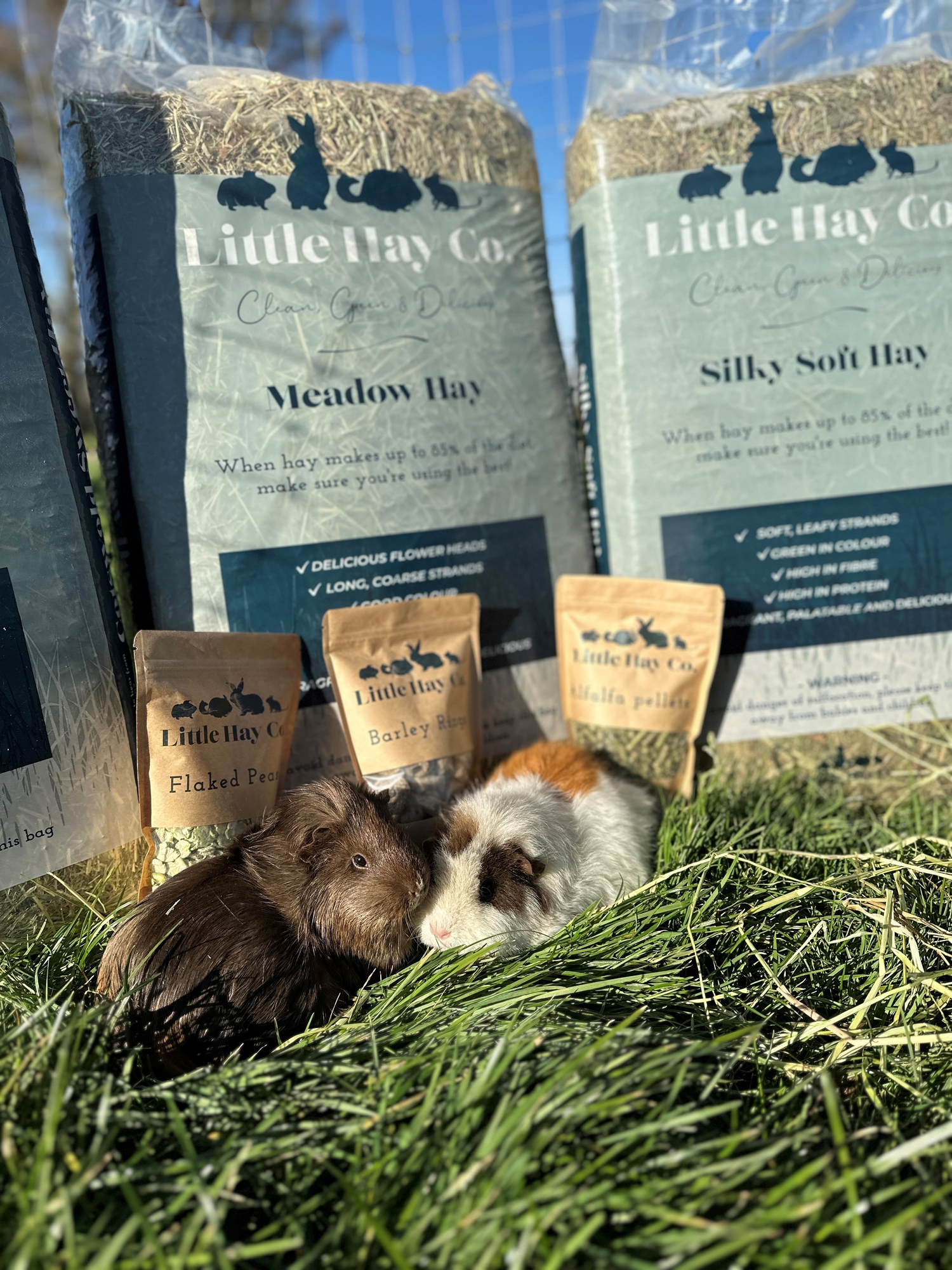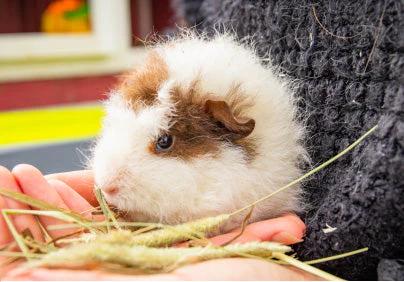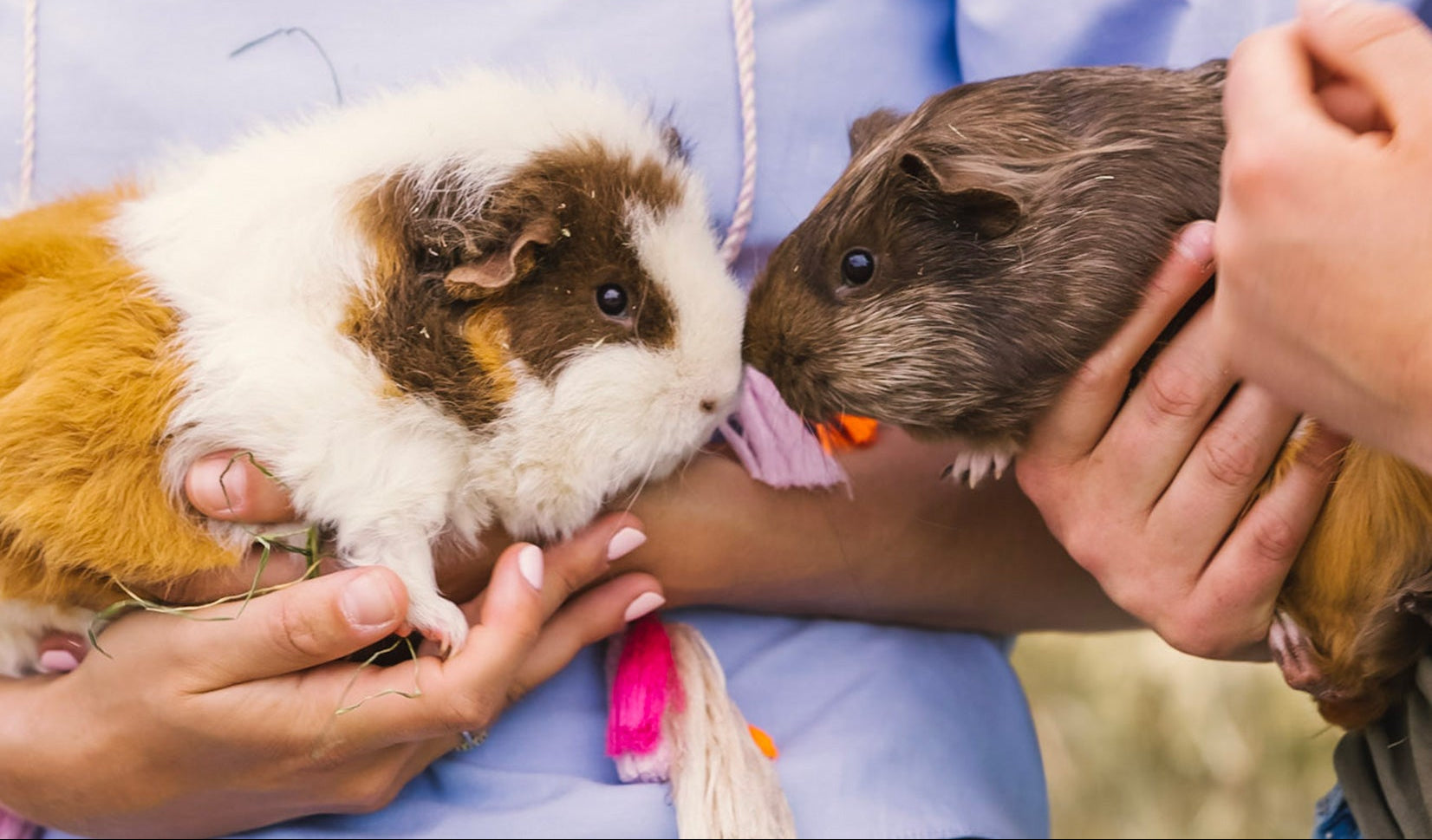What is the ideal diet for a guinea pig?
Guinea pigs require a diet rich in fresh hay, such as timothy hay, which should make up the majority of their food intake. Additionally, they need a daily serving of fresh vegetables, including leafy greens like kale and romaine lettuce. Pellets specifically formulated for guinea pigs can also be given in moderation. Guinea pigs do not produce Vitamin C so it is important to give them veg which is rich in vitamin C, like Peppers, regularly. While Guinea pigs need calcium and absorb around 50% of the calcium they consume for bone and teeth strength, they can also have "too much" calcium. When this happens it will show in deposits in their urine, it is important to keep an eye on the vegetables you feed your piggies and ensure you are getting the right balance for each individual pig.
We recommend our Cotswold sweet hay and Silky Soft hay for guinea pigs. Both hays have a good calcium content for guinea pigs and while the cotswold sweet hay is coarse, it has a softer feel than timothy and meadow so is not so much of a risk for eye poke. Our Silky Soft hay is perfect for bedding and eating, as is it so fine and soft!
How often should I clean my guinea pig's cage?
It is important to clean your guinea pig's enclosure at least once a week, ideally with an additional daily spot clean. Remove any soiled bedding, wipe down the cage with a pet-safe cleaner, and replace the bedding with fresh materials. Regular cleaning helps maintain a hygienic environment for your guinea pig and prevents the buildup of odors and bacteria.
Do guinea pigs need companions?
Yes, guinea pigs are social animals and thrive in the company of their own kind. It is recommended to have at least two neutered guinea pigs living together, as they provide companionship and mental stimulation for each other. Usually Boars work well in pairs while Sows can thrive in larger same sex groups or multiple Sows plus a neutered Boar. However, ensure that you introduce them properly and provide enough space in the cage for each guinea pig to have their own territory.
How can I keep my guinea pig entertained?
Guinea pigs are active animals and require mental and physical stimulation. Provide them with toys, such as tunnels, chew toys, and balls, to keep them engaged. Creating an enriching environment with hiding spots and platforms can also encourage exploration and play. Additionally, spending time interacting with your guinea pig through gentle handling and supervised playtime outside the cage is beneficial for their well-being.
What are common health issues in guinea pigs?
Guinea pigs are prone to certain health problems, including dental issues, respiratory infections, and skin conditions. Regular veterinary check-ups are essential to monitor their health and catch any potential problems early. Signs of illness in guinea pigs include loss of appetite, weight loss, lethargy, sneezing, or discharge from the eyes or nose. If you notice any of these symptoms, consult a veterinarian immediately.
How can I handle my guinea pig properly?
When handling a guinea pig, it is important to support their body with both hands, ensuring they feel secure. Avoid picking them up by their sensitive stomach area and never grab them by the scruff of their neck. Approach them calmly and speak softly to reassure them. If your guinea pig seems uncomfortable or anxious, give them some time to adjust before attempting to handle them again.
What is the average lifespan of a guinea pig?
On average, guinea pigs live between 5 to 7 years. However, with proper care, some guinea pigs can live up to 8 years or even longer. Providing a balanced diet, a clean and spacious living environment, regular veterinary care, and plenty of love and attention can contribute to a longer and healthier life for your guinea pig.
Remember, guinea pigs are delightful pets that require commitment and care. By following these guidelines and providing a nurturing environment, you can ensure the well-being and happiness of your furry friend.













